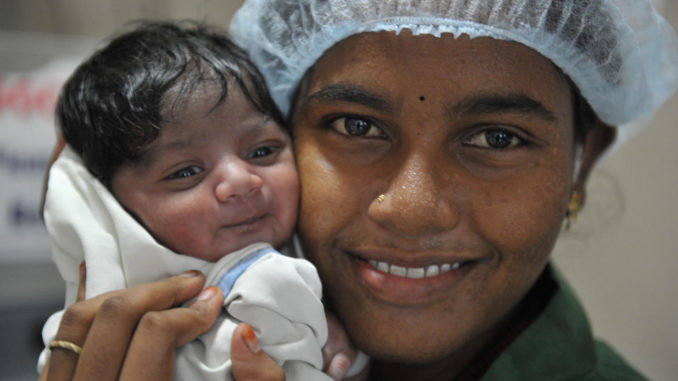
In 2020, UNICEF is calling for world leaders and nations to invest in health workers with the know-how and equipment to save every newborn
TORONTO, Jan. 1, 2020 /CNW/ – An estimated 1,004 babies will be born in Canada on New Year’s Day, representing 0.25 per cent of the estimated 392,078 babies to be born around the world, according to UNICEF.
“Babies born today in Canada and across the globe remind us all why we must continue to strive to create a better world, one where every child can grow up safe and happy and reach their potential,” said David Morley, President and CEO of UNICEF Canada. “Children everywhere are facing many challenges for a bright future – including poverty, rising inequality, a record number of ongoing conflicts and the threat of climate change. We must do our best to defend every child’s right to a childhood.”
Giving a chance to babies world-wide
“The beginning of a new year and a new decade is an opportunity to reflect on our hopes and aspirations not only for our future, but the future of those who will come after us,” said Henrietta Fore, UNICEF Executive Director. “As the calendar flips each January, we are reminded of all the possibility and potential of each child embarking on her or his life’s journey—if they are just given that chance.”
Fiji in the Pacific will most likely deliver 2020’s first baby. The United States, its last. Globally, over half of these births are estimated to take place in eight countries:
- India — 67,385
- China — 46,299
- Nigeria — 26,039
- Pakistan — 16,787
- Indonesia — 13,020
- The United States of America — 10,452
- The Democratic Republic of Congo — 10,247
- Ethiopia — 8,493
Each January, UNICEF celebrates babies born on New Year’s Day, an auspicious day for child birth around the world.
However, for millions of newborns around the world, the day of their birth is far less auspicious.
In 2018, 2.5 million newborns died in just their first month of life; about a third of them on the first day of life. Among those children, most died from preventable causes such as premature birth, complications during delivery, and infections like sepsis. In addition, more than 2.5 million babies are born dead each year.
Over the past three decades, the world has seen remarkable progress in child survival, cutting the number of children worldwide who die before their fifth birthday by more than half. But there has been slower progress for newborns. Babies dying in the first month accounted for 47 per cent of all deaths among children under five in 2018, up from 40 per cent in 1990.
UNICEF’s Every Child Alive campaign calls for immediate investment in health workers with the right training, who are equipped with the right medicines to ensure every mother and newborn is cared for by a safe pair of hands to prevent and treat complications during pregnancy, delivery and birth.
“Too many mothers and newborns are not being cared for by a trained and equipped midwife or nurse, and the results are devastating,” added Fore. “We can ensure that millions of babies survive their first day and live into this decade and beyond if every one of them is born into a safe pair of hands.”
About UNICEF
UNICEF is the world’s leading humanitarian organization focused on children. We defend the right to childhood so children everywhere grow up safe, happy and healthy and able to reach their potential. UNICEF works in the most challenging areas to provide protection, healthcare and immunizations, education, safe water and sanitation and nutrition. As part of the United Nations, our unrivaled reach spans more than 190 countries and territories, ensuring we are on the ground to help the most disadvantaged children. While part of the UN system, UNICEF relies entirely on voluntary donations to finance our live-saving work. Please visit unicef.ca and follow us on Twitter, Facebook and Instagram.
SOURCE UNICEF Canada


Leave a Reply